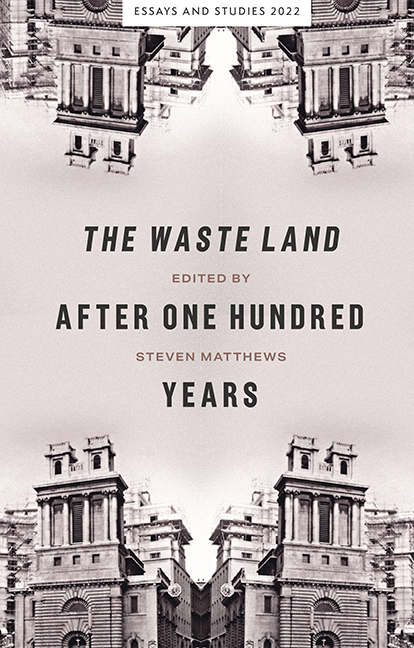Book contents
- Frontmatter
- Contents
- Notes on Contributors
- Introduction
- 1 A ‘Dangerous Model’: Resisting The Waste Land
- 2 Beyond the Sanskrit Words: Eliot and the Colonial Construction of Poetic Modernism
- 3 ‘An Icon of Recurrence’: The Waste Land’s Anniversaries
- 4 ‘O City, city’: Sounding The Waste Land
- 5 Lost and Found in Translation: Foreign Language Citations in The Waste Land
- 6 The Poetic Afterlife of The Waste Land
- 7 Compositional Process and Critical Product
- 8 Hypocrisy and After: Persons in The Waste Land
- Index
3 - ‘An Icon of Recurrence’: The Waste Land’s Anniversaries
Published online by Cambridge University Press: 08 October 2022
- Frontmatter
- Contents
- Notes on Contributors
- Introduction
- 1 A ‘Dangerous Model’: Resisting The Waste Land
- 2 Beyond the Sanskrit Words: Eliot and the Colonial Construction of Poetic Modernism
- 3 ‘An Icon of Recurrence’: The Waste Land’s Anniversaries
- 4 ‘O City, city’: Sounding The Waste Land
- 5 Lost and Found in Translation: Foreign Language Citations in The Waste Land
- 6 The Poetic Afterlife of The Waste Land
- 7 Compositional Process and Critical Product
- 8 Hypocrisy and After: Persons in The Waste Land
- Index
Summary
The Waste Land remains a cultural and social barometer. It is a work that invites responses from each generation of readers, revealing the values of that generation through the shifting hinterlands of appreciation and critique the poem inevitably provokes. Each generation has its own Eliot, too, and this has been no more the case than when the thorny question of Eliot's politics moves into view, especially accusations of misogyny and anti-Semitism. If Eliot remains a revered figure of the twentieth century, his authority has been rocked by the antiquated views which punctuated his thinking at certain stages of his life.
Concurrently, readers, above all students in the classroom, frequently now demand that the social and political content, contexts and contemporary resonances of ‘great’ works be taken seriously. The Waste Land is a prime example. Megan Quigley's 2019 edited cluster for Modernism/modernity, ‘Reading “The Waste Land” with the #MeToo Generation’, provides compelling evidence of students’ perspectives in recent years. Quigley's account of the difference between her own experiences as a student and that of the cohorts coming before her now is illuminating:
The first time I heard ‘The Waste Land’ called an ‘abortion poem’ I thought I had misheard my student; now I hear it frequently (and convincingly) called a poem that stages and performs racial and gender violence and investigates trans* experience. My own teachers directed me away from Lil [and] Philomel to Nightingales and Keats – our students want Keats, but also to discuss, really discuss, the assault of the typist.
What is notable is the demand to blend what we might call traditional Eliot scholarship – hunting for allusions, attempting to pin down meaning – with socially engaged readings that evaluate hitherto neglected or overshadowed topics in Eliot's work. What is equally intriguing, though, is that there is still this demand to read Eliot at all. As Quigley notes, Eliot's reputation has unavoidably suffered a decline:
Eliot went from a heyday of popularity after winning the Nobel Prize in 1948 (14,000 people crammed in to hear him give a public reading in 1956) to a nadir of dislike (that one is harder to place temporally – maybe with the publication of T.S. Eliot and Anti-Semitism [1995], which explored Eliot's prejudice, or Carole Seymour-Jones's biography Painted Shadow [2001] and the film Tom and Viv [1994], which portrayed the breakdown of his first marriage and his wife's institutionalization.
- Type
- Chapter
- Information
- The Waste Land after One Hundred Years , pp. 71 - 92Publisher: Boydell & BrewerPrint publication year: 2022

